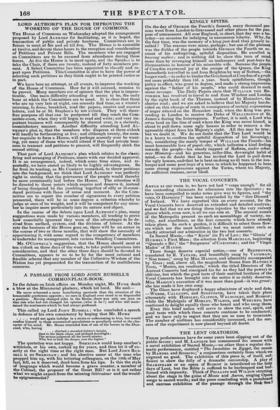THE VOCAL CONCERTS.
AMPLE as our room is, we have not had "verge enough" for all the contending claimants for admission into the Spectator; we have been compelled to make notes give way to figures, and "thy voice, 0 Harmony !" has been superseded by the "dire Discord" of Ireland. We have regretted this on every account, for the Vocal Concerts have deserved an extended and detailed analysis; and we feel that we are doing them injustice by the very cursory glance which, even now, is all we can aim at. The musical annals of the Metropolis present no such an assemblage of variety, no- velty, and excellence, as the four concerts which have already taken place. In such a garden, it is difficult to select those flow- ers which are the most brilliant; but we must notice such as chiefly attracted our admiration in the two last concerts. In Sacred Music,—the " Kyrie" (in F) of LEO; the "Gloria" of HUMMEL'S First Mass ; the selection from MARCELL°, beginning " Quando o Re ;", the " Surgamus" of CARISSIMI; and the "Virgin Madre" of HAYDN.
Three Songs deserve especial notice,—one of BEETHOVEN, translated by E. TAYLOR, and beautifully sung by VAUGHAN; "Non temer, sung by Miss MASSON, and admirably accompanied by Goss and, above all, the magnificent Scena from HANDEL'S Teseo, "koriro, ma vendicata," which the titled Directors of the Ancient Concerts had consigned (as far as they had the power) to oblivion, but which the good taste of their untitled brethren of the Vocal Concerts has brought into the notice it so richly deserves. Miss MASSON'S execution of it was more than good—it was great; she has made it her own song. The Glees have displayed a happy admixture of style and date, —WEBBE, CALLCOTT, and SPOFFORTH, have taken their place alternately with HORSLEY, CLIFTON, WALMISLEY, and l3iSHOP; while the Madrigals of MORLEY, WILBYE, and WEELKES, have continued to'delight equally those who heard and who sung them. Even this brief notice will serve to show the zeal, spirit, and good taste with which these concerts continue to be conducted; and we have only to regret that they are so soon to terminate. The number of auditors has considerably increased, and the suc-. cess of the experiment is now placed beyond all doubt.














 Previous page
Previous page